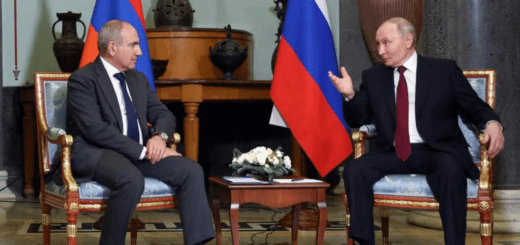Pashinyan Wants New Constitution to Conform to His So-Called ‘Real Armenia’ Vision

Armenia’s Constitution and Coat of Arms
Prime Minister Nikol Pashinyan said that a new Armenian Constitution must confirm to his vision of a so-called “real Armenia,” which excludes Artsakh and calls for “revisiting” Armenia’s contemporary history.
Speaking at an event marking the Constitution’s 30th anniversary at Yerevan’s Opera House on Saturday, Pashinyan further went on to say that all previous referenda for Armenia’s Constitution, including the first one 30 years ago that saw the participation of the majority of Armenian voters at the time, were “imposed” on them and did not reflect the “free will” of the people.
Pashinyan justified the need for a new constitution by arguing that his proposed ideology of a “Real Armenia” could not take shape under the current constitution.
“The Constitution, as I see it, is an agreement among citizens about their relationships with each other, between individuals, between citizens and communities, communities and the government, and more broadly, an agreement on the legal order of the country, which should be enshrined in the Constitution,” Pashinyan told the gathering on Saturday.
Pashinyan added that while Armenia’s Constitution and legal system were developed by “respectable experts,” they did not emerge through a transparent and participatory democratic process. “As a result, many citizens continue to see the homeland as a platform for resisting the state rather than as a shared civic project,” he said.
He argued that resistance to the state has become a reflex and that this mindset must be overcome. In his view, many Armenians continue to perceive the legal system established in the country over the past 35 years as something imposed on them, rather than a framework created by their own will for governing life in Armenia.
Addressing the lack of the public’s embrace of the legal system, the Prime Minister said he has come to a widely known but rarely spoken conclusion: “the Constitutions adopted since 1995 have left open the question of whether they were truly the result of the people’s free will and free voting.” In his view, this ambiguity undermines public trust.
He emphasized that Armenia now needs a new Constitution-one that reflects the current reality and is adopted through the free will of the people.
“That reality is this: The Republic of Armenia tells its citizens that the homeland and the state are no longer separate. Unlike the previous period of our millennia-long history, our message today must be clear. And that message must be articulated in a new Constitution adopted through the free will of the Armenian people. That Constitution must say: citizen of the Republic of Armenia, you are the state, you are the Republic of Armenia,” Pashinyan concluded.





